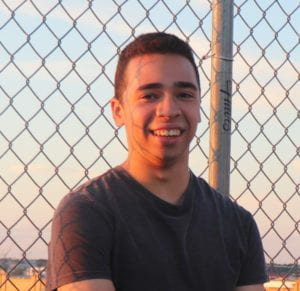Brian Ruiz, a junior at Gallatin concentrating in prison abolition, was one of eleven NYU students awarded the Gallatin Global Fellowship in Human Rights for the 2019-20 academic year. Brian interned remotely in Summer 2020 with Radical Love Consciousness (RLC), a grassroots organization that strives for the liberation of those who have been marginalized and oppressed.
The 2020 Human Rights Fellows detailed their summer experiences on the fellowship blog site, and we asked Brian to share how the COVID-19 pandemic impacted his work.
This interview has been edited for length and clarity.
 Kim Foote: How was your experience of working remotely with RLC?
Kim Foote: How was your experience of working remotely with RLC?
Brian Ruiz: My overall experience with RLC was reflective in regards to understanding our roles within the prison abolition (PA) and transformative justice (TJ) movement. Roles are meant to change over time as we understand the spaces we are part of and what we can contribute. My role focused on developing popular education workshops on PA and TJ. Not being able to meet with people from RLC in person was disappointing, but it allowed us to redefine our connections and ensure that they remained sustainable throughout this pandemic.
KF: How did grassroots organizing manifest remotely?
BR: RLC is very hands-on and normally hosts many in-person events within their space. Remote organizing was achieved through Zoom meetings, phone calls, and group chats, and made us rethink and be critical about our approaches to connecting with and providing accessibility to folx around the world, including in Latin America and Africa. Technological methods present difficulties, such as with respecting confidentiality, since digital surveillance has been employed by oppressors to infiltrate and disrupt grassroots organizing; however, we established clear community boundaries and agreements.
KF: What do you see as priorities for the PA and TJ movements moving forward, especially in light of the pandemic and recent protests against policing policies?
BR: The PA and TJ movements have been focusing on priorities such as freeing all people in COVID-19-infected carceral spaces, as well as continuing to dismantle police and state-sponsored violence, center survivors/victims, support grassroots community organizations and organizers and mutual aid work, honor and protect the land from the environmental destruction carceral spaces contribute to, long-term sustainability through global solidarity, and reparations for all Black, indigenous, queer, disabled, femme, trans, non-binary, and other marginalized folx.
KF: How did your work with RLC impact your understanding of human rights?
BR: I came to understand how the universal human rights framework is a direct product of the violence imposed by Western settler-colonial nations. RLC is reimagining human rights through a lens of reindigenization, which is a two-fold process: it is the abandonment of ideals and systems established through colonization as well as an evolution towards and rememory of ancient modes of knowledge and community. Reindigenization allows us to use tactics like PA and TA to dismantle carceral systems and build a post-carceral world that honors and protects our human rights.
